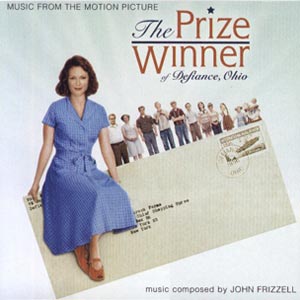The Prize Winner of Defiance, Ohio
Original music composed and conducted by John Frizzell
Performed by The Hollywood Studio Symphony
Fiddle solos by Sara Watkins; guitar solos by Sean Watkins.
Available on Milan (M2-36143)
Running Time: 49:33 (John Frizzell score: 30:18)
Amazon UK Amazon US

If one were to go by the soundtrack cover and production stills, The Prizewinner of Defiance Ohio is some kind of hybrid of Todd Haynes’ sublime Far From Heaven and the somewhat less revered The Brady Bunch. The inspired-by-life story follows Ohio woman Evelyn Ryan (Julianne Moore), who supported her family through her knack for writing prize-worthy-prose ditties, despite her depressed alcoholic husband (Woody Harrelson). Not a film destined, in other words, to either set the box office on fire or merit an essay in Film Comment. But it does have Julianne Moore in it – and it doesn’t look entirely like a comedy (Moore being particularly dire in those) – so there must be some value in it, even if reviews are a bit lukewarm.
The soundtrack album is a blend of period songs and score, with slight weighting towards score, though the tracks alternate throughout the course of the album. The songs include ‘I’m sitting on top of the world’ (here in fresh recordings featuring K D Lang and actor-turned-singer Woody Harrelson), ‘Bye bye blues’ and ‘Wheel of Fortune’. The score is by John Frizzell, best known for his scores for Alien Resurrection and Gods and Generals, the latter an attractive melodic score for full orchestra. Frizzell’s score for Prizewinner is a more modest affair than the Ted Turner-bankrolled Gods, a collection of gorgeous nostalgic themes written for a chamber-size ensemble.
In fact it is remarkable how well his score cues match with the surrounding source material. Jane Andersen, writer/director of the film, writes in the album liner notes that ‘even when the screenplay was in its raggedy first draft, I was hearing Les Paul’s manically optimistic guitar careening through the scenes… [Frizzell] gets the ‘50s guitar sound like no one out there and together we pored over all the old greats like Chet Atkins, Speedy West and Jimmy Bryant.’ So much so that when Frizzell’s first cue began – the sprightly guitar-fiddle jig ‘The Affadasies’ – I mistook it for a period piece. The instruments are all lovingly close-miked, recalling Elmer Bernstein’s acoustic on Far From Heaven. The mix is warm and favors the details, and fiddle and guitar soloists Sara and Sean Watkins tie it all together with emotive performances.
‘Main Title’ offers up the score’s principal theme, a catchy major-key melody carried from piano, to guitar and percussion doubling with percussion, to bass pizzicato, leading into a grainy fiddle and guitar duet over percussion. Frizzell lays out his entire instrumental base in this cue. ‘Anatomy of a Contest’ reads more like Carl Stalling homage – with woodwind accents on pizzicato runs bringing to mind a ‘50s game show of sorts. Another clear period reference is ‘Ryan Family Album’, with its harmonising barbershop quartet vocals and electric guitar riffs. The only track of this ilk that truly borders on annoying is ‘Shopping Spree’, it’s “Yeah, yeah, yeah” vocals about as inspiring as you’d expect them to be.
Though the scale of the score is small, Frizzell does not rest merely on attractive melodies, and each arrangement is unique in some way. The solemn harp and bass opening to ‘Tulips’ leads into a minor key fiddle melody that hints at the darker undercurrents of the story. A warmer doubling of cello and piano ends the cue with another theme – this one more hopeful. This warmer melody is carried by piano and guitar in ‘Feed First’. ‘We Won’ has a lovely climax for cello, flute, clarinet and harp, closing with a cello solo.
Another nice thing about this score is that, for all its short length, each track seems to offer up a new theme. A gorgeous new theme appears in ‘Do You Ever Wish’, carried mostly by solo cello with a soft string accompaniment, the track ending with yet another new theme. ‘Making a Break for Goshen’ recalls the period instrumentals in much the same way as ‘The Affadasies’, though the melodies are fresh. The principal melodies return in fresh arrangements for the final tracks – ‘Forgive Him’ (the best cue), ‘Spilled Milk’ (a more brooding piece modelled on ‘Quartet’ from Thomas Newman’s Angels in America), with the ‘Do You Ever Wish’ theme providing a satisfactory emotional climax to the album before the main theme is reprised in ‘Hittin’ the Road’.
This is a humble score, but a good one, and I count it as my favourite work by Frizzell to date. If the score is derivative in its references to the music of the period, that is also its freshness – drawing on an idiom we haven’t heard much in film music. Though the score and song tracks do mix well together on album (and one wouldn’t wish for more of either), I do wish they had been separated out into separate sections, so to better serve those listeners who won’t be buying the score just to recapture the musical journey of the film. I’m one of those listeners who tunes in solely for the Frizzell score, and the song tracks are for me distraction at best. If the album loses marks at all, it’s for that.
Michael McLennan
3
Return to Reviews Index